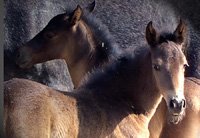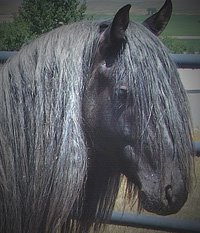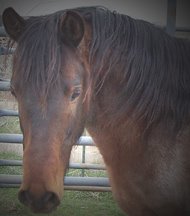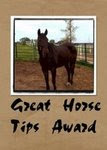Intense physical conditioning. Consumption of feed concentrates. Long trailer rides. Frequent change of venue and companions. Is it any wonder that equine endurance athletes are prone to the development of Equine Gastric Ulcer Syndrome?
Obviously, the stress of travel and competition can scarcely be avoided in the life of an endurance horse. Furthermore, although exercise is known to promote beneficial intestinal motility, prolonged exercise -- particularly at a canter and/or on an empty stomach -- can result in ulceration due to splashing of gastric acid onto the non-glandular portion of the stomach. Prolonged exercise also draws blood circulation away from the stomach and stimulates acid production, further increasing risk of ulcer formation, and the electrolytes many endurance riders administer to ward off metabolic problems may exacerbate existing ulcers [Holbrook, et al, 2005].
It is possible that many of the mild colics experienced in association with endurance racing are actually caused by gastric ulcer pain, not impactions or gas. Fortunately, no major blood loss seems to occur as a result of EGUS in endurance horses, and I found no evidence that gastric ulcers may perforate the wall of the stomach or otherwise result in equine fatality.
Little research exists on EGUS in endurance horses because race day isn’t conducive to endoscopy, which requires 12-18 hours of fasting followed by sedation. However, a 2003 Pride Project research study of 140 endurance horses indicated that 51.09% of the participating horses had gastric ulcers. A study by J.E. Neito, published in 2004, found that 67% of the endurance horses tested suffered from EGUS. Both studies concluded that endurance horses tend to have milder cases of EGUS than are commonly suffered by Thoroughbred racehorses. Neither study indicates a percentage of afflicted horses that is dramatically out of line with the 60% incidence of EGUS in performance horses across the spectrum of disciplines.
Though a substantial percentage of equine endurance athletes suffer from EGUS, omeprazole -- the drug most recommended and proven to cure and prevent gastric ulcers -- is banned by the AERC. Considering that omeprazole is not considered to be performance enhancing, and that the AERC actively promotes the welfare of horses participating in the sport of endurance, omeprazole's presence on the prohibited substances list may seem incongruous.
In 2005, the AERC issued a letter expressing its reasons for prohibiting the use of omeprazole during endurance competition. The letter is included in its entirely in the minutes from the June 27, 2005 meeting of the AERC’s Board of Directors. An excerpt is quoted below:
After much discussion of the benefits and drawbacks of such a modification, the veterinary committee has come to the decision not to recommend a modification of the current drug rules to allow the use of omeprazole while competing.
This decision is based on several factors:
1) Allowing the use of a testable drug during competition is a far deviation from AERC’s long-standing policy of absolutely opposing the presence of drugs during endurance ride competition.
2) The reasoning for allowing omeprazole during competition could, and we anticipate will, be used for other existing drugs such as anti-inflammatory agents. For example, flunixin (Banamine) certainly has beneficial, protective effects in the horse and is not considered performance enhancing in the normal horse.
3) The affects of long-term use of omeprazole are not known and the veterinary committee will not recommend nor endorse off label (very long term) use of the drug.
4) Horses symptomatic for gastric ulcers should not be competing.
An article by Marcia Smith, DVM, published in the October 2008 issue of Endurance News, the AERC's monthly publication, included a recommendation that horses be given maintenance doses of GastroGard (omeprazole) for four days preceding a competition. The last dose must be administered at least 24 hours prior to the start of the competition to comply with recommended withdrawal times in Appendix E of the AERC's drug rule.
According to its manufacturer, Merial, GastroGard's beta blocking effect lasts only 24 hours. Because an endurance competition officially begins upon pre-ride vetting, which usually takes place the evening before the ride itself, it seems unlikely that Smith's recommendation would benefit an endurance horse during a race, though of course there is value in lowering stomach acidity during travel to the ride venue.
AERC publications recommend that horses with gastric ulcers (at least, those that are symptomatic) be voluntarily suspended from competition. Preventative measures such as frequent feeding of roughage and application of antacids during stressful circumstances are encouraged, though the ingredients in some antacid products marketed for use in horses are also on the AERC's prohibited substances list. Sucralfate is specifically listed as a permitted substance in Appendix C of the AERC's drug rule, and may be beneficial in easing the discomfort of an endurance horse suspected of having gastric ulcers.
It seems that, if we wish to participate in endurance riding (or almost any equine sport), our horses are more likely than not to suffer some degree of gastric ulceration. We must, therefore, either choose not to participate -- perhaps even to avoid domestic horse keeping altogether! -- or else commit to doing our best to prevent the onset of EGUS, cure it when possible, and manage symptoms as necessary to keep our equine partners comfortable and content.
The final post of this series will cover the specifics of how I have chosen to deal with the subject of EGUS right here at In the Night Farm.
________________________________________________
Related Posts
Introduction: Equine Gastric Ulcer Series
Strategies for Prevention of Equine Gastric Ulcer Syndrome
Pharmaceutical and Alternative Treatment Options for EGUS
Equine Ulcer Supplement Options
A Fair Question: Equine Athletes, Equine Ulcers
Bringing it Home: EGUS Prevention at In the Night Farm
Sheer Brilliance: Aloe and MSM as Alternative Therapy for EGUS
Q & A: Aloe and MSM as Alternative Therapy for EGUS
The Good Bad News: Gastric Ulcers in Equines
________________________________________________
Want to read more posts like this one? We deliver!
Subscribe to The Barb Wire







 Whoopee.
Whoopee.

































